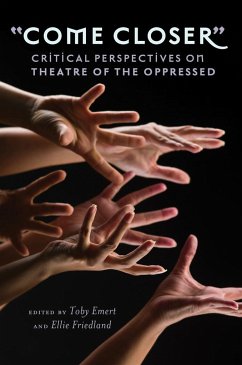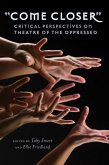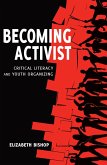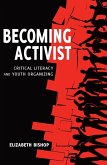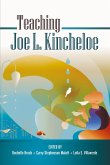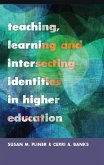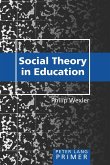In «Come Closer,» community activists, scholars, and theatre artists describe their Theatre of the Oppressed (TO) work and how they are transforming TO for new purposes, new audiences, and new settings. Each chapter features a first-person narrative on how the authors' work both honors and transforms the vision of Augusto Boal, whose imaginative response to human oppression offers the world an aesthetic intervention that has the power to move both the oppressors and the oppressed to the possibility of transformative dialogue. Contributors to this important volume center their ideas and their descriptions of their practice within theoretical frameworks, particularly Paulo Freire's Pedagogy of the Oppressed. «Come Closer» will be useful to undergraduate and graduate students, as well as administrators and professors interested in the topic of democratic education.
«The most important things we ever teach are these: you are a human being of incalculable value; you are, as well, a work-in-progress making your wobbly way through a living, cascading history in-the-making; you need no one's permission to interrogate your world. In this surprising collection the truth of those lessons is brought brilliantly to light in a wide range of settings and circumstances. Here artists and teachers and students together ask the fundamental questions: Who am I? How did I get here and where am I headed? What's my story and how shall I join with others to write the next chapter? The answers send all of them spinning off into projects of production and repair.» (William Ayers, Retired Distinguished Professor of Education and Senior University Scholar, University of Illinois at Chicago, Author of 'To Teach: The Journey, in Comics' and 'Teaching Toward Freedom')
«Against a world backdrop where people from Egypt to Wisconsin are once again re-asserting their ontological predisposition to be actors of history, [this book] could not be timelier. The contributors to this illuminating volume re-affirm, through their thoughtful and insightful narratives, Augusto Boal's conviction that, as humans, we are all born poets; institutions intervene from keeping us from continuing to be poets. The authors of 'Come Closer' not only provide readers with a language of critique to deconstruct the social drama of oppression, but they also meticulously and passionately challenge readers to embrace a language of hope that inspires and dares us to unleash our repressed poetry and imagine the potentiality of what it means to experience a fully liberating humanity.» (Donaldo Macedo, Distinguished Professor of Liberal Arts and Education, University of Massachusetts, Boston)
«'Come Closer' thoughtfully and usefully provides ongoing reflections, adaptations, and extensions of Augusto Boal's Theatre of the Oppressed. Well-structured around three endlessly dynamic topics - possibilities around forum theatre, the role of the joker, and the contexts in which TO takes place - the book provides accounts of practitioners across the world evaluating and renewing TO, at the same time honoring Boal and supporting what so many of us already know - that he was one of the great personages of theatre in the twentieth and early twenty-first centuries.» (Jan Cohen-Cruz, Director, Imagining America: Artists and Scholars in Public Life, Syracuse University; Co-editor of 'A Boal Companion: Dialogues on Theatre and Cultural Politics')
«This compelling text reveals the evolution of Theatre of the Oppressed initiatives over the last forty years. Grounded in Freire's ideas of praxis and Boal's belief that theatre can be a catalyst for transformational dialogue, these articulate authors illuminate how the work takes shape in a variety of contexts, from higher education to public education classrooms, to teacher education programs, to community based settings, to intercultural work. A compelling case is made for the flexibility of Boal's philosophical frame and strategies to create transformational dialogue across age groups, contexts, and formats, creating spaces where status quo is disrupted and oppression both external and internal is probed, challenged and acted upon. The roles of protagonist, of ally, and of joker, so familiar to us in TO, are considered from multiple lenses. This book is significant for those of us engaged in any transformational practices informed by Theatre of the Oppressed.» (Lisa Donovan, Director, Creative Arts in Learning, Lesley University)
«Against a world backdrop where people from Egypt to Wisconsin are once again re-asserting their ontological predisposition to be actors of history, [this book] could not be timelier. The contributors to this illuminating volume re-affirm, through their thoughtful and insightful narratives, Augusto Boal's conviction that, as humans, we are all born poets; institutions intervene from keeping us from continuing to be poets. The authors of 'Come Closer' not only provide readers with a language of critique to deconstruct the social drama of oppression, but they also meticulously and passionately challenge readers to embrace a language of hope that inspires and dares us to unleash our repressed poetry and imagine the potentiality of what it means to experience a fully liberating humanity.» (Donaldo Macedo, Distinguished Professor of Liberal Arts and Education, University of Massachusetts, Boston)
«'Come Closer' thoughtfully and usefully provides ongoing reflections, adaptations, and extensions of Augusto Boal's Theatre of the Oppressed. Well-structured around three endlessly dynamic topics - possibilities around forum theatre, the role of the joker, and the contexts in which TO takes place - the book provides accounts of practitioners across the world evaluating and renewing TO, at the same time honoring Boal and supporting what so many of us already know - that he was one of the great personages of theatre in the twentieth and early twenty-first centuries.» (Jan Cohen-Cruz, Director, Imagining America: Artists and Scholars in Public Life, Syracuse University; Co-editor of 'A Boal Companion: Dialogues on Theatre and Cultural Politics')
«This compelling text reveals the evolution of Theatre of the Oppressed initiatives over the last forty years. Grounded in Freire's ideas of praxis and Boal's belief that theatre can be a catalyst for transformational dialogue, these articulate authors illuminate how the work takes shape in a variety of contexts, from higher education to public education classrooms, to teacher education programs, to community based settings, to intercultural work. A compelling case is made for the flexibility of Boal's philosophical frame and strategies to create transformational dialogue across age groups, contexts, and formats, creating spaces where status quo is disrupted and oppression both external and internal is probed, challenged and acted upon. The roles of protagonist, of ally, and of joker, so familiar to us in TO, are considered from multiple lenses. This book is significant for those of us engaged in any transformational practices informed by Theatre of the Oppressed.» (Lisa Donovan, Director, Creative Arts in Learning, Lesley University)

